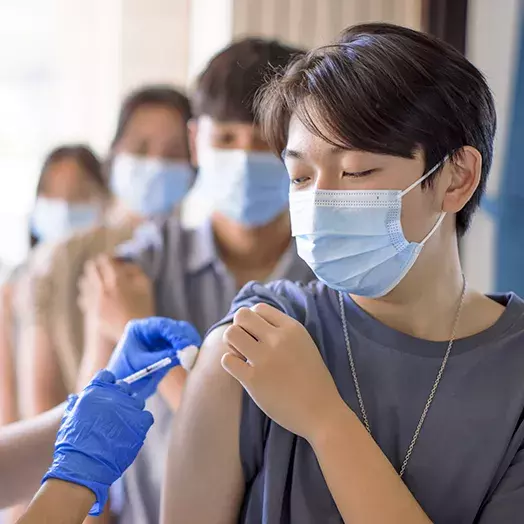A Johns Hopkins Carey Business School study identified behavioral patterns associated with reluctance among some adults for taking the COVID-19 vaccine.

Johns Hopkins Study Explores Disparities in COVID-19 Vaccine Hesitancy and Potential Approaches to Reduce it
Article Highlights
- Research found that women and individuals with lower incomes or education levels were less willing to be vaccinated.
- On average, vaccine hesitant individuals said they would get the vaccine when 64 percent of the general public had been vaccinated.
- Carey’s research has implications for how vaccine promotion campaigns can be better developed and implemented.
A new study co-authored by faculty at the Johns Hopkins Carey Business School identified behavioral patterns associated with reluctance among some adults for taking the COVID-19 vaccine.
The study, conducted among adults in China, suggests that information about the vaccination behaviors of people one personally knows can be more influential in changing the individual’s vaccine hesitancy than information about vaccine use of the general public. Results of the study are published in the July 9 edition of JAMA Health Forum, the health policy journal of the American Medical Association.
China is the world’s most populous country. Approximately 16 percent of the nation is fully vaccinated, according to the current data compiled by the Johns Hopkins Coronavirus Resource Center.
“Our results suggest that sharing information about the vaccination behavior with a person’s social networks may be more effective at reducing the person’s vaccine hesitancy than nationwide or regional vaccination statistics,” said Haiyang Yang, co-author of the study, an associate professor at Johns Hopkins Carey Business School and a core faculty member of the Johns Hopkins Business of Health Initiative. “These findings have implications for how vaccine promotion campaigns can be better developed and implemented.”
For the study, Yang and co-author Jingjing Ma, an assistant professor at Peking University, investigated the vaccination behavior of a nationally representative sample of more than 12,000 Chinese adults in January 2021 when only 2 percent of participants were vaccinated for COVID-19.
What to Read Next

research
COVID-Related Joblessness May Pose Long-Term Challenge to Public Health, Study FindsOverall, the research found that women and individuals with lower incomes or education levels were less willing to be vaccinated. Having more knowledge about the COVID-19 vaccines (for example, how a COVID-19 vaccine works) was associated with lower vaccine hesitancy. Analyses also showed that differences in vaccine knowledge could account for disparities in vaccine hesitancy across income and education levels. This suggests that vaccine knowledge dissemination may help reduce COVID-19 vaccine hesitancy in certain disadvantaged communities.
Participants not yet willing to receive the vaccine were also randomly assigned to respond to one of two additional questions. One-half was asked at what percentage of the general public had to be vaccinated for COVID-19 before they themselves would get vaccinated. The other half was asked to indicate the percentage for “people you personally know.”
On average, vaccine hesitant individuals indicated that they would get the vaccine when 64 percent of the general public had been vaccinated. This number was much lower—54 percent—when the reference group was “people you personally know. This pattern suggests that, rather than leveraging aggregate vaccination statistics per se, vaccine promotion campaigns should also be designed to amplify the positive influence of each person’s vaccination across that individual’s social networks.


